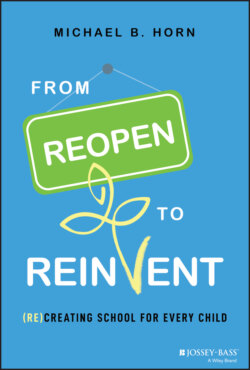Читать книгу From Reopen to Reinvent - Michael B. Horn - Страница 17
Curriculum
ОглавлениеIn life, success isn't just about the academic knowledge one masters or one's “intelligence.” Those are important, but other skills and habits are also critical. After achieving a baseline of academic preparedness, many studies suggest that these other skills and habits, along with access to social networks, rise in importance.
Jeremy misses building these skills and habits because his school's curriculum doesn't adequately address them.
In many schools, things like working on projects, teaching habits of success, providing actionable feedback, and connecting students to new networks of people aren't integrated into the curriculum—or are offered only as a dessert to the traditional main meal.
By not receiving these opportunities, Jeremy misses out on many experiences that could change his life. Take habits of success, which include mindsets and behaviors like self-direction, agency, growth mindset, and executive functions,2 to illustrate why.
Jeremy, like most of us, didn't come out of the womb as an organized human being. He hasn't learned explicit habits in the context of his academics to help him excel. Not having support to learn self-direction or executive function skills means that it may be hard for Jeremy to complete and turn in his homework each day. Unlike many of his peers, he doesn't have an adult there to remind him. That lowers his self-efficacy.
It's one thing to preach about growth mindset or grit to children, but it's a different thing to model it. Our education system does the opposite of modeling it, instead affixing labels to students, sorting them into static groups, and signaling that their effort doesn't matter.
This is because in today's system, time is held as a constant and each student's learning is variable.
Students move from concept to concept after spending a fixed number of days, weeks, or months on the subject. Educators teach, sometimes administer a test, and move students on to the next unit or body of material regardless of their results, effort, and understanding of the topic. Students typically receive feedback and results much later and only after they have progressed.
The system signals to students that it doesn't matter if you stick with something, because you'll move on either way. This approach undermines the value of perseverance and curiosity, as it does not reward students for spending more time on a topic. It also demotivates students, as many become bored when they don't have to work at topics that come easily to them or fall behind when they don't understand a building-block concept. Yet the class continues to progress, and students develop holes in their learning. This fixed-time, variable-learning system fails students.
Contrast this with a mastery-based—or competency-based3—learning model in which time becomes the variable and learning becomes guaranteed. Students only move fully from a concept once they demonstrate mastery of the knowledge and skills at hand. If they fail, that's fine. Failure is an integral part of the learning process. Students stay at a task, learn from the failures, and work until they demonstrate mastery. Success is guaranteed.
Mastery-based learning systematically embeds perseverance into its design. It showcases having a growth mindset, because students can improve their performance and master academic knowledge, skills, and habits of success.
Even if Jeremy's teachers talk about the importance of perseverance and growth mindset, today's system in which he's stuck doesn't reward it. It undermines it.
Similarly, by not providing timely feedback that is actionable, schools demotivate learners. Research shows that when a student receives feedback but cannot improve their performance with that feedback, it has a negative influence on student learning. Conversely, when the student can use the feedback, it positively impacts learning.4 It also opens the door to more positive and personalized interactions with teachers to build trust.
Most schools also don't make a point of offering students access to new networks that help them discover new opportunities and endeavors beyond those of their immediate family and friends. Connecting students to new individuals can be life-altering. It brings students together with people who can open doors and allows them to build passions in areas about which they would never otherwise know. Introducing students to successful individuals, particularly those with whom they share commonalities, can inspire them. In life, success is often not about what you know, but who you know. There's a mountain of research to back that up.
But children like Jeremy struggle because they don't get these sorts of opportunities in school. And all too often they don't have the offerings in their own lives to compensate.
